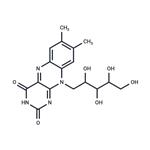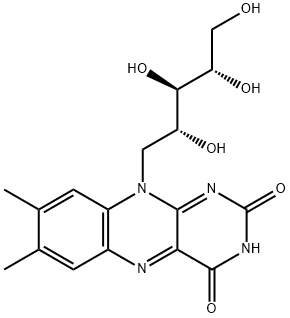Riboflavin:Functions, Sources,Biosynthesis and Side Effects
May 12,2025
Riboflavin is a type of B vitamin. It is water soluble, which means it is not stored in the body. Water-soluble vitamins dissolve in water. Leftover amounts of the vitamin leave the body through the urine. The body keeps a small reserve of these vitamins.

Functions
Riboflavin (vitamin B2) works with the other B vitamins. It is important for body growth. It helps in red blood cell production. It also aids in the release of energy from proteins.
Sources
Riboflavin is unique among the water-soluble vitamins in that milk and dairy products make the greatest contribution to its intake in Western diets. Meat and fish are also good sources of riboflavin, and certain fruit and vegetables, especially dark-green vegetables, contain reasonably high concentrations.
Biosynthesis
Biosynthesis takes place in bacteria, fungi and plants, but not animals.The biosynthetic precursors to riboflavin are ribulose 5-phosphate and guanosine triphosphate. The former is converted to L-3,4-dihydroxy-2-butanone-4-phosphate. Guanosine is degraded to 4-hydroxy-2,4,5-triaminopyrimidine, which is transformed into 5-amino-6-(D-ribitylamino)uracil. These two compounds are then the substrates for the penultimate step in the pathway, catalysed by the enzyme lumazine synthase in reaction EC 2.5.1.78.
Side Effects
In humans, there is no evidence for riboflavin toxicity produced by excessive intakes and absorption becomes less efficient as dosage increases. Any excess riboflavin is excreted via the kidneys into urine, resulting in a bright yellow color known as flavinuria.During a clinical trial on the effectiveness of riboflavin for treating the frequency and severity of migraines, subjects were given up to 400 mg of riboflavin orally per day for periods of 3–12 months. Abdominal pains and diarrhea were among the side effects reported.
- Related articles
- Related Qustion
- Riboflavin: Producing bacteria; Benefits and Targeted Drug Delivery Jan 10, 2024
Riboflavin is an essential, water-soluble vitamin (B2) and a component of basic cellular metabolism.
- The Benefits of Riboflavin Nov 23, 2022
The passage introduces the benefits of Riboflavin.
- Application of Riboflavin Oct 30, 2019
Riboflavin is a B vitamin. It is involved in many processes in the body and is necessary for normal cell growth and function. It can be found in certain foods such as milk, meat, eggs, nuts, enriched flour, and green vegetables.
Supplementation with pyridoxal 5'-phosphate monohydrate can synthesize neurotransmitters such as dopamine and serotonin, maintaining a healthy nervous system.....
Nov 4,2025Biochemical Engineeringlutathione is one of the most abundant endogenous antioxidants found in the body and plays an important role in maintaining exogenous antioxidants (ie, vitamins C and E) in their active reduced roles.....
May 12,2025Biochemical EngineeringRiboflavin
83-88-5You may like
- Riboflavin
-

- 2025-12-06
- CAS:83-88-5
- Min. Order:
- Purity: 0.99
- Supply Ability:
- Riboflavin
-

- $0.00 / 1removed
- 2025-12-05
- CAS:83-88-5
- Min. Order:
- Purity: 99.43%
- Supply Ability: 10g
- Riboflavin
-

- $0.00 / 1removed
- 2025-12-05
- CAS:83-88-5
- Min. Order:
- Purity: 99.43%
- Supply Ability: 10g






